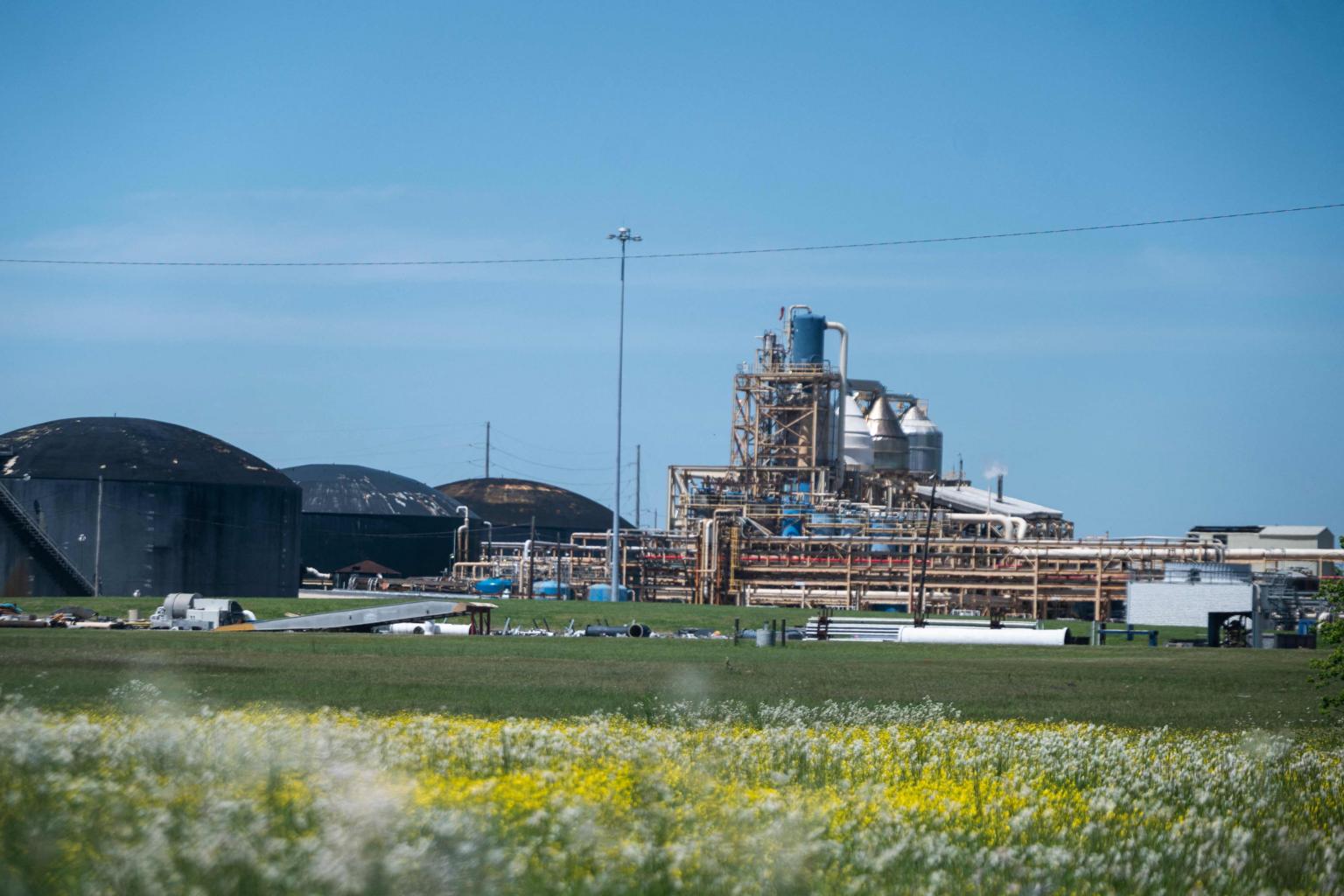Climate change stirs ghosts of America's toxic past
Sign up now: Get ST's newsletters delivered to your inbox

The Olin chemical plant is seen in McIntosh, Alabama, on April 12, 2021.
PHOTO: AFP
MCINTOSH, UNITED STATES (AFP) - Murky flood waters of Alabama's Tombigbee River rippled over ground tainted with mercury and a pesticide so toxic that US officials outlawed it decades ago, a dangerous past that could cause even more damage with climate change.
Hundreds of America's worst polluted places, like a neighbouring pair of chemical plant sites on the Tombigbee, are threatened by storms, rising waters, fires and other extreme weather made more intense as the Earth warms.
"There might be a whole lot of danger for us," said 59-year-old Darrell Wayne Moss, who lives across the street from the sprawling Olin chemical plant. "It makes you afraid."
A tall, barbed-wire topped fence rings the factory - which is a jigsaw-like collection of pipes, storage tanks, shiny metal vats and sheds - and bears signs warning "DANGER: RESTRICTED AREA."
The Olin site, and the property at the neighboring BASF works, are part of the US Superfund programme which oversees the clean up of worst-of-the-worst hazardous waste dumps, industrial facilities and mines.
Ciba-Geigy Corp's factory, which is now owned by BASF, began making the powerful pesticide DDT in the 1950s as well as other heavy industrial chemicals. Toxic waste was dumped into open, unlined pits, some of which were in the river's flood plain.
DDT is a nasty compound that was banned from US use in 1972 over the risks to people and animals' health, and because it stays potent in the environment for an unusually long time.
The prohibition of DDT has also been credited with helping the resurgence of America's national symbol, the bald eagle, which struggled to reproduce after being poisoned by the pesticide.
'Heavily contaminated'
Just south of the Ciba site is the Olin factory, which dumped waste like mercury and DDT for decades up to the 1970s into a 76-acre reservoir near the river.
The mercury is enough of a concern near both plants that state authorities have warned people not to eat largemouth bass fish caught in certain stretches of the Tombigbee because they can have unhealthy concentrations of the metal.
Cade Kistler, programme director at environmental group Mobile Baykeeper, steered a boat toward the river wetlands tainted by the toxic substances on a recent day and explained the climate risk.
"The more that it is submerged, the more those contaminants, DDT and others, have the ability to get out in your waterway and migrate downstream into Mobile Bay," he said, referring to the major body of water on the state's southern coast.
"This whole area was pretty heavily contaminated," he added.
Olin did not reply to e-mails seeking comment and BASF said in a statement that it "regards the protection of health, safety and the environment as our most important responsibility... We are committed to operating facilities in a safe and environmentally responsible fashion."
Chemical plants still operate at both sites.

Ciba and Olin were among 945 Superfund sites, about 60 per cent of the total, that watchdog Government Accountability Office (GAO) found in 2019 were potentially at risk from climate change.
It called on the Environmental Protection Agency (EPA), which administers the Superfund programme, to look into hardening the locations' defenses.
Jim Woolford, who headed the national Superfund policy office for almost 14 years until his retirement in 2020, said that a review of the programme's climate response is in order.
"It would be a re-evaluation, if you will, of what has happened over the past 40 years," Woolford told AFP, referring to the programme's age. "I'm hoping (President Joe Biden's) administration does this, but we'll see."
Decades-long clean up

Biden has jumped directly into the climate crisis with a virtual summit of world leaders this week where he'll aim to revive international cooperation on the issue.
It comes months after the end of Donald Trump's presidency, during which, Woolford diplomatically noted, questions like Superfund climate policies were not at the "forefront".
Superfund's project manager for Ciba and Olin, Beth Walden, said there is a lot of cleaning up to do at the sites along the river and those areas are a concern with or without climate change.
The clean up has been a slow, decades-long process and for former Ciba worker Winston Barnes, it is alarming that chemicals remain in the ground.
He retired in 2013 after over four decades at the factory, lives about a mile from Olin's fence-line and knows very well from his work how dangerous the waste is.
"I thought they had dug it up. You've got to have some concern about DDT because it is so corrosive," he said seated on his home's porch. "I worked for them for years and I had just forgotten about it."


